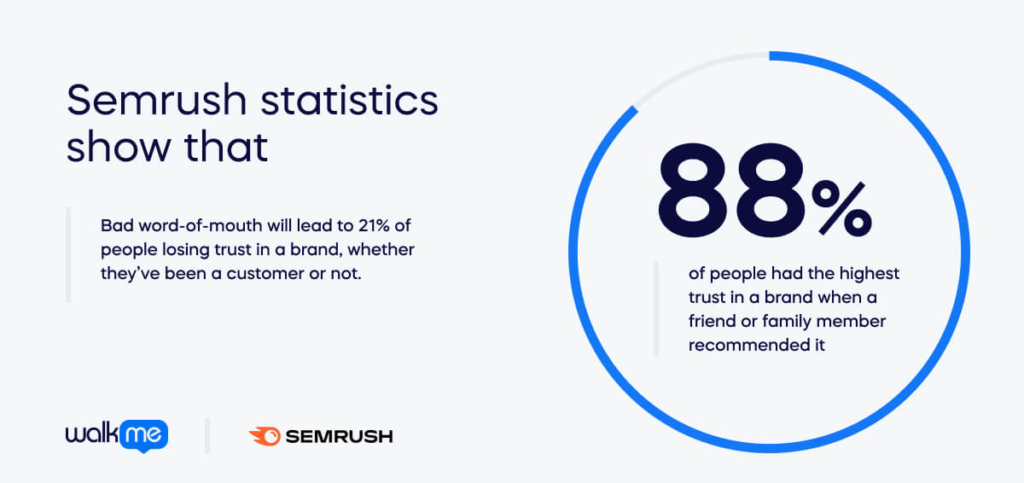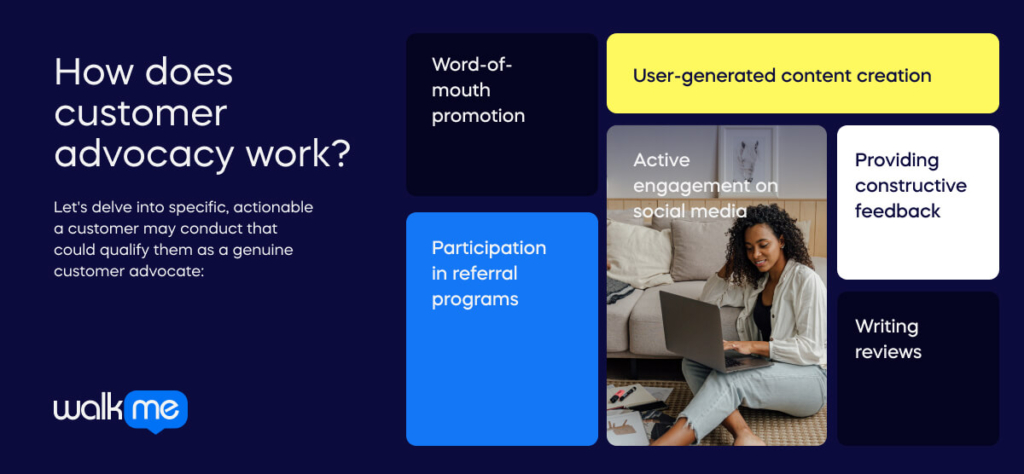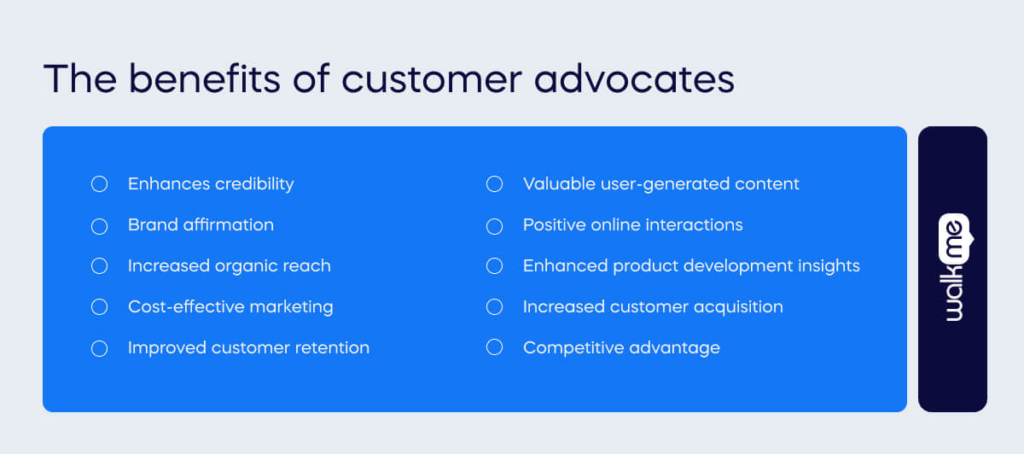When it comes to increasing sales efforts, word-of-mouth stands out as the most effective method for recommending a business. SEMrush research shows that this influential form of marketing not only drives an impressive $6 trillion in annual global spending but also accounts for a significant 13% of all sales.
However, amplifying brand or product visibility through word-of-mouth isn’t an easy feat. Businesses must pay extra attention to cultivating end-to-end customer-centricity to turn loyal consumers into genuinely passionate customers willing to advocate for their products.
Those smart enough to bolster customer advocacy know that delivering products and services to customers increasingly tailored to remedy their specific needs and preferences separates a future-ready business from a forgettable one.
In this article, we’ll explore customer advocacy and why it’s important for businesses that wish to solidify brand visibility, presence, and reputation. We’ll also explore how customer advocacy works, its benefits, and how to launch advocacy projects that nurture life-long B2C relationships.
What is customer advocacy?
Customer advocates are individuals who transition from long-term, loyal customers into active brand participants, extending, promoting, and endorsing the visibility and reach of a company’s products and services.
They work as a mouthpiece for the brand, promoting products and services through positive word-of-mouth, recommendations, and testimonials via social media, product review sites, or other online platforms.
Semrush statistics show that 88% of people had the highest trust in a brand when a friend or family member recommended it. Bad word-of-mouth will lead to 21% of people losing trust in a brand, whether they’ve been a customer or not.

Customers can become passionate brand advocates who willingly express their satisfaction with a product or service. This is a long-proven method of expanding marketing efforts from the ground up and can eclipse the other forms of marketing, i.e., ad placements.
Driving short-sighted sales strategies that end when a conversion or sale is closed are the characteristics of outdated marketing methods. Modern companies recognize that cultivating customer advocacy is the most effective approach for increasing sales frequency and setting up methods to sustain sales long into the future.
How to turn loyal customers into customer advocates
Creating customer advocates hinges on providing a comprehensive customer experience (CX) that guides customers from initial engagement to advocacy. The journey starts with the first interaction, aiming to convert leads into first-time buyers, a critical step indicating the potential for repeat business and the effectiveness of CX and marketing strategies.
To evolve customer loyalty into advocacy, companies must offer tailored end-to-end experiences, including personalized interactions and robust social media presence, alongside leveraging websites, emails, newsletters, and feedback channels for broader engagement.
Enhancing CX at every stage ensures customers feel appreciated and connected to the brand. When customers perceive their experience as holistic and consistently satisfactory, they’re more likely to become brand advocates.
Transitioning to this stage involves formally recognizing their loyalty through personalized acknowledgments, exclusive offers, or loyalty programs, thereby cementing their bond with the brand and motivating them to share their positive experiences, thus extending the brand’s influence.
How does customer advocacy work?

Determining the difference between a loyal, passionate customer and a customer advocate actively helping to promote a company’s brand is important.
While deploying excellent customer experiences that generate loyal and repeat customers is an overwhelming win, customer advocacy is a clearly defined role that entails more specific and concrete actions and activities customers make to promote a brand.
Let’s delve into specific, actionable a customer may conduct that could qualify them as a genuine customer advocate:
- Word-of-mouth promotion: Genuine advocates become brand ambassadors by endorsing the product, sharing positive experiences in real-life conversations, and influencing others through authentic recommendations.
- User-generated content creation: Advocates express satisfaction and actively contribute to the brand’s narrative by creating and sharing content. This user-generated material serves as authentic testimonials, strengthening the brand’s credibility.
- Participation in referral programs: customer advocates participate in referral programs, demonstrating a commitment to expanding the brand’s customer base. Their involvement becomes a mutually beneficial partnership.
- Active engagement on social media: Advocates leverage their social media influence to amplify the brand’s visibility. By engaging with the brand online, they contribute to a positive online presence, fostering a sense of community among like-minded followers.
- Providing constructive feedback: Genuine advocates offer valuable insights through constructive feedback, showcasing their vested interest in the brand’s continuous improvement and success.
- Writing reviews: Advocates willingly share their experiences by writing reviews on various platforms. These reviews serve as authentic testimonials for potential customers and contribute to the brand’s online reputation, influencing purchase decisions positively.
What are the benefits of customer advocates?

Having a reputation for delivering high-quality products and services, a strong brand identity, a marketing presence, and advocates in the form of loyal customers can be a winning formula for long-term success.
According to Search Engine Watch, increased online shopping and social media usage directly impact buying decisions, with those influenced by social media four times more likely to spend more on purchases.
Genuine customers in the form of social media influencers and celebrities can skyrocket the visibility and perception of a brand with one endorsement, tweet, or Instagram post. Excluding paid partnerships, these types of customer advocates can enhance brand awareness, whose reputation companies rely on to bring in many new customers.
The benefits of employing the help of customer advocates prove plentiful, with positive impacts in the form of improved credibility, brand affirmation, and an increase in organic reach.
Recognizing and harnessing the power of customer advocates offers several advantages for a business. Here is a summary of the most prominent ones:
- Enhances credibility: Being genuine customers, advocates lend a sense of authenticity that enhances the brand’s credibility and builds trust among potential customers, making them more likely to convert.
- Brand affirmation: Advocates sharing their positive experiences act as powerful testimonials, solidifying the brand’s reputation and affirming its commitment to delivering exceptional products or services.
- Increased organic reach: Through word-of-mouth and organic promotion, advocates expand the brand’s reach to new audiences, creating a ripple effect that can lead to significant organic growth.
- Cost-effective marketing: Leveraging customer advocates reduces the need for extensive marketing campaigns. Advocates willingly promote the brand, producing a cost-effective and authentic marketing strategy.
- Improved customer retention: Recognizing and rewarding advocates fosters a deeper sense of loyalty. Satisfied advocates are more likely to continue their relationship with the brand, contributing to sustained customer retention.
- Valuable user-generated content: Advocates generate a wealth of user-generated content, including detailed reviews, testimonials, and creative materials. This content serves as authentic and relatable material for marketing efforts.
- Positive online interactions: Advocates actively engaging in online discussions create a positive community around the brand. This fosters a supportive environment where potential customers feel encouraged to explore and trust the brand.
- Enhanced product development insights: Deeply invested in the brand, advocates often provide valuable insights and feedback. This information can be crucial for product development, ensuring that offerings align with customer preferences and expectations.
- Increased customer acquisition: Positive advocacy serves as a potent tool for customer acquisition. Potential buyers are more likely to trust recommendations from satisfied customers, making advocacy an effective method for attracting new customers.
- Competitive advantage: A robust base of customer advocates provides a chance to outmaneuver competitors. Brands with enthusiastic advocates stand out in the market, creating a positive perception that can influence purchasing decisions in a crowded marketplace.
How to deploy customer advocacy projects
When a business succeeds in cultivating a loyal customer base through delivering exceptional customer experiences, transitioning these customers into formal advocates will require setting up advocacy projects and partnerships.
These strategies outline a few foundational aspects for reinforcing positive customer relationships and empowering them to become true brand champions.
Real-world incentives
Unlike the throwaway “discounts for first-timers” or random seasonal price drops that act as blanket promotions for the entire customer base, launch bespoke rewards schemes. These could be through tiered loyalty programs, personalized discounts based on purchase history, and referral initiatives.
These strategic and personalized approaches enhance individual customer experiences and create a dynamic and mutually beneficial ecosystem that actively encourages long-term customer loyalty and advocacy.
Formal acknowledgment
Customers receiving follow-up emails post-purchase, providing discounts, or expressing gratitude for shopping with them are likely to return and make another purchase. This principle applies equally to loyal customers, as personalized acknowledgments of their continued loyalty convey that their commitment to the brand is recognized and valued.
Empowerment
Brands that do not reflect and remain agile in response to shifting consumer demands risk failing into obscurity. Take the now-defunct Blockbuster’s rigid approach to evolving needs around how customers consume digital media in the early 2000s, especially in the face of emerging online streaming services. Its inability to anticipate what its customers wanted contributed to its eventual downfall.
Businesses can empower loyal customers who know their brand best by giving them a seat at the table and involving them in improving their offerings. In pursuing enhanced customer engagement efforts like market research activities, questionnaires, and surveys to collect qualitative and quantitative data, businesses can gain valuable and tangible insights that ensure they remain on the pulse of customer expectations.
Offer exclusive perks
As we approach the final stages of creating customer advocates, consider the impactful addition of exclusive experiences. It goes beyond just selling to your consumer and focuses on personalized interactions, large discounts, event invites, and congratulatory gifts. This thoughtful approach helps reinforce a genuine connection, turning satisfied customers into enthusiastic advocates.
Brand advocate
Depending on the efficacy of your advocacy program, loyal customers may evolve into brand ambassadors and influencers. This transition thrives on personal connections, exclusive collaborations, and genuine relationships.
Businesses gain the power of authentic influence by empowering these advocates to shape the brand narrative. Recognizing their impact, brands transform loyal customers into influential voices. These brand ambassadors, sharing their experiences organically, significantly contribute to the brand’s visibility and credibility within their circles. It’s the culmination of a journey where customer loyalty becomes powerful, extending far beyond individual transactions.
Customer advocacy: a metric of success
Customer advocacy is symptomatic of a healthy and diverse marketing cycle and reflects a company’s willingness to assume a future-ready state. It’s more than a marketing strategy; it’s a nod to authentic relationship building.
Despite spending not fully yet returned to pre-pandemic levels, marketing budgets accounted for 9.5% of overall company revenue in 2022, according to Gartner—up from 6.4% in 2021.
Those that maintain high levels of customer satisfaction create repeat purchasing patterns from returning customers and enable opportunities to generate authentic buzz around a product or service through customer advocacy.
Our exploration has shown that customer relationships are not just transactional; they are about building genuine connections that contribute to making a business better.
For business leaders reliant on positive customer perceptions as a key driver of success, the journey doesn’t end with a sale. And in the age of social media, where consumer voices echo loudly, businesses must prioritize genuine engagement.
The emergence of brand ambassadors and influencers emphasizes the trust customers place in peer recommendations over traditional advertising.
Getting this type of buy-in requires continuous investment in personalized experiences, actively seeking customer feedback, adapting data-based strategies, and ultimately fostering a community where advocacy thrives naturally.


